Autoantigens - Study guides, Class notes & Summaries
Looking for the best study guides, study notes and summaries about Autoantigens? On this page you'll find 58 study documents about Autoantigens.
Page 2 out of 58 results
Sort by

-
FNP_NR507_Week6_Case Study Template Pathophysiology & Clinical Findings of the Disease|100% COMPLETE QUESTIONS AND ANSWERS, study guide.
- Exam (elaborations) • 4 pages • 2024
-
- $8.99
- + learn more
Week 6 Case Study Template Pathophysiology & Clinical Findings of the Disease 1. Based on the review of the history, physical and lab findings what is the most likely diabetes diagnosis for this patient? The most likely diabetes diagnosis for this patient is diabetes type 1. Though the criteria of type 1 are the same for type 2, the distinguishing symptoms are polydipsia, polyphagia, polyuria, and weight loss (book). 2. Explain the pathophysiology associated with the chosen diabetes diagn...
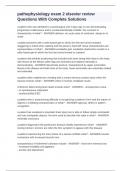
-
Pathophysiology HESI Exam Questions & Answers 100% CorrectPathophysiology HESI Exam Questions & Answers 100% CorrectPathophysiology HESI Exam Questions & Answers 100% Correctv
- Exam (elaborations) • 5 pages • 2024
- Available in package deal
-
- $11.49
- + learn more
The nurse is caring for a 9-month-old infant with gluten-induced enteropathy. Which common term for this disorder would the nurse use when discussing the infant's diagnosis with the parents? - ANSWER-celiac disease Which autoantigens are responsible for the development of Crohn's disease? - ANSWER-Crypt epithelial cells Which organism would the nurse explain was responsible for a client's recent diagnosis of malaria? - ANSWER-Sporozoa The nurse explains to the parents of a 6 year old...
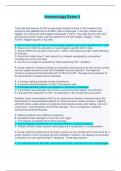
-
Immunology Exam 4 - Questions and Answers
- Exam (elaborations) • 32 pages • 2023
- Available in package deal
-
- $21.49
- + learn more
Immunology Exam 4 - Questions and Answers Treg cells that express FoxP3 are generally thought to have T-cell receptors that recognize self-peptides bound to MHC class II molecules. In the skin, keratin and filaggrin are among the self-antigens expressed. FoxP3+ Treg cells found in skin and skin-draining lymph nodes might be specific for the self-antigen, filaggrin. These FoxP3+ filaggrin-specific Treg cells: A. Would inhibit the activation of naive filaggrin-specific and keratin-specific CD4 T ...
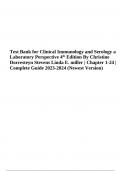
-
Test Bank for Clinical Immunology and Serology a Laboratory Perspective 4th Edition By Christine Dorresteyn Stevens Linda E. miller | Complete Chapter 1-24 2024 (Newest Version)
- Exam (elaborations) • 159 pages • 2024
-
- $33.49
- + learn more
Test Bank for Clinical Immunology and Serology a Laboratory Perspective 4th Edition By Christine Dorresteyn Stevens Linda E. miller | Complete Chapter 1-24 2024 (Newest Version) Eosinophils are involved in the immune response against: A. viruses. B. intracellular bacteria. C. parasites that cannot be phagocytized. D. extracellular bacteria. ANS: C 2. Which of the following are components of both innate and adaptive immune responses? A. Immunoglobulins B. T helper cells C. Macrophages D...
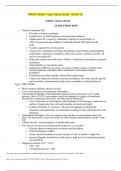
-
NR507 Week 7 Quiz Study Guide - 09-02-19
- Exam (elaborations) • 6 pages • 2024
-
- $11.39
- + learn more
NR507 Week 7 Quiz Study Guide - 09-02-19 WEEK 7 QUIZ STUDY GUIDE ENDOCRINE • Diabetes Insipidus (DI) o Disorder of posterior pituitary o Insufficiency of ADH leading to polyuria and polydipsia o Nephrogenic DI- caused by inadequate response of renal tubules to ADH (vasopressin) and inability to reabsorb filtered H20 back into the body o Usually acquired but can be genetic o Acquired is r/t disorders and drugs that damage renal tubules- pyelonephritis, amyloidosis, destructive uropathi...

-
NURS 6501 Final Exam Review Guide (Weeks 7-11) Latest Update - Walden University.
- Exam (elaborations) • 25 pages • 2023
-
- $12.99
- + learn more
NURS 6501 Final Exam Review Guide (Weeks 7-11) Latest Update - Walden University. • Structure and Function of the Cardiovascular and Lymphatic Systems • Pathophysiological changes related to Pain, Temperature Regulation, Sleep, and Sensory Function • How does patient characteristics such as racial and ethnic variables impact altered physiology? • How does the pathophysiology of spinal injuries impact patients? • What is the impact of patient characteristics on disorders and alte...
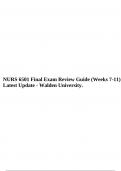
-
NURS 6501 Final Exam Review Guide (Weeks 7-11) Latest Update - Walden University.
- Exam (elaborations) • 25 pages • 2023
-
- $12.99
- + learn more
NURS 6501 Final Exam Review Guide (Weeks 7-11) Latest Update - Walden University. • Structure and Function of the Cardiovascular and Lymphatic Systems • Pathophysiological changes related to Pain, Temperature Regulation, Sleep, and Sensory Function • How does patient characteristics such as racial and ethnic variables impact altered physiology? • How does the pathophysiology of spinal injuries impact patients? • What is the impact of patient characteristics on disorders and alte...
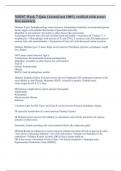
-
NR507 Week 7 Quiz (Actual test 100% verified with error-free answers)
- Exam (elaborations) • 9 pages • 2023
- Available in package deal
-
- $12.49
- + learn more
Diabetes Type I Pathophysiology correct answers Autoimmune-mediated: environmental-genetic factors tiggers cell-mediated destruction of pancreatic beta cells. Idiopathic or non-immune: Secondary to other disease like pancreatitis. Autoantigens bind to beta cells and circulate blood and lymph-->Activation of T helper 1 + 2 lymphocytes-->Macrophages with releases of IL and TNFa, T cytotoxic cells, B lymphocytes to produce islet cells autoantibodies-->Destruction of beta cells with dec...
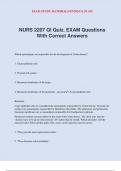
-
NURS 2207 GI Quiz. EXAM Questions With Correct Answers
- Exam (elaborations) • 47 pages • 2024
-
- $12.49
- + learn more
NURS 2207 GI Quiz. EXAM Questions With Correct Answers Which autoantigens are responsible for the development of Crohn disease? 1. Crypt epithelial cells 2. Thyroid cell surface 3. Basement membranes of the lungs 4. Basement membranes of the glomeruli - answer1. Crypt epithelial cells Rationale: Crypt epithelial cells are considered the autoantigens responsible for Crohn disease. Thyroid cell surfaces are autoantigens responsible for Hashimoto thyroiditis. The pulmonary and glomerular ...

-
NURS 6501 Final Exam Review Guide (Weeks 7-11) Latest Update - Walden University.
- Exam (elaborations) • 25 pages • 2023
-
- $12.99
- + learn more
NURS 6501 Final Exam Review Guide (Weeks 7-11) Latest Update - Walden University. • Structure and Function of the Cardiovascular and Lymphatic Systems • Pathophysiological changes related to Pain, Temperature Regulation, Sleep, and Sensory Function • How does patient characteristics such as racial and ethnic variables impact altered physiology? • How does the pathophysiology of spinal injuries impact patients? • What is the impact of patient characteristics on disorders and alte...

How did he do that? By selling his study resources on Stuvia. Try it yourself! Discover all about earning on Stuvia


